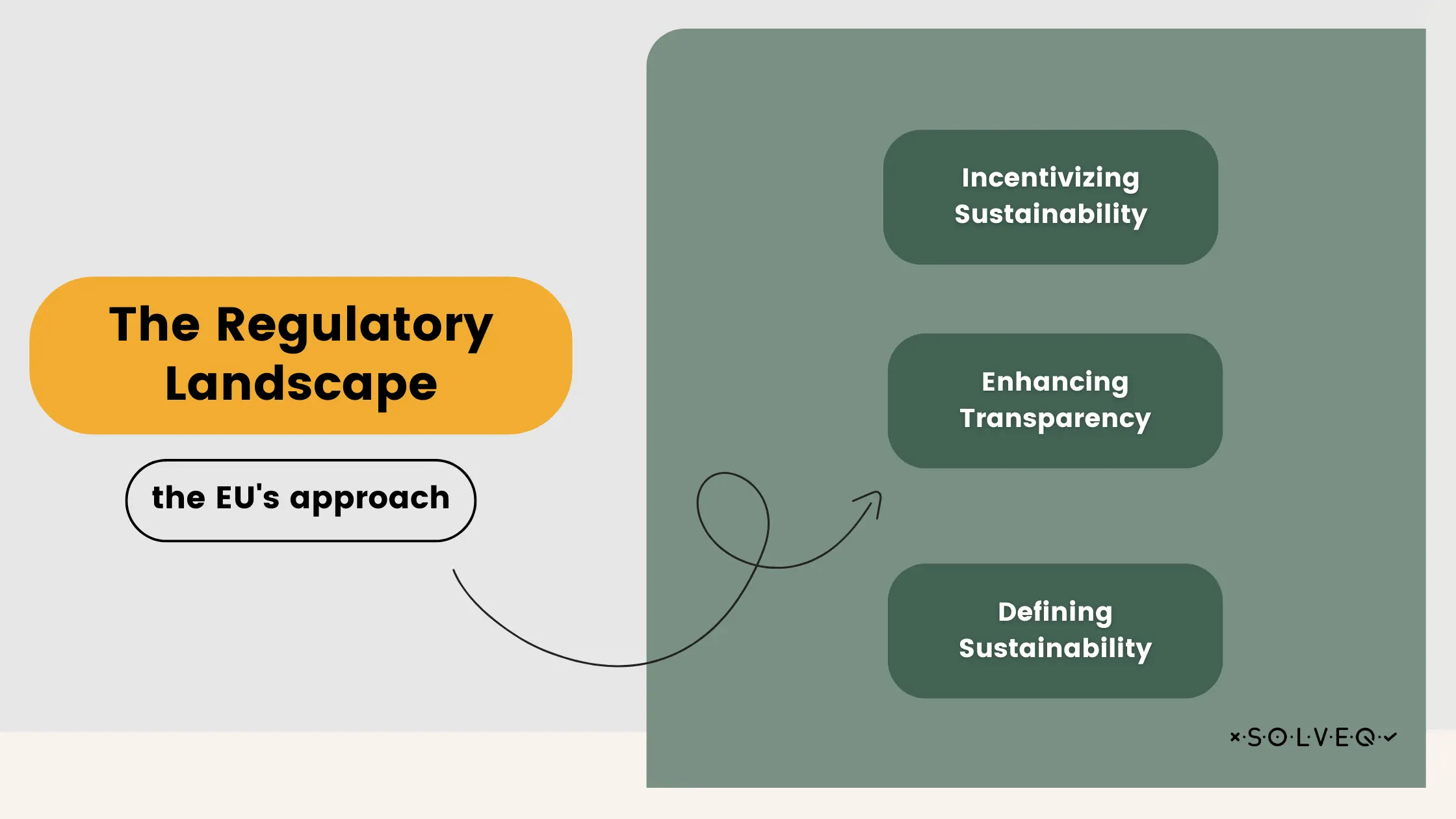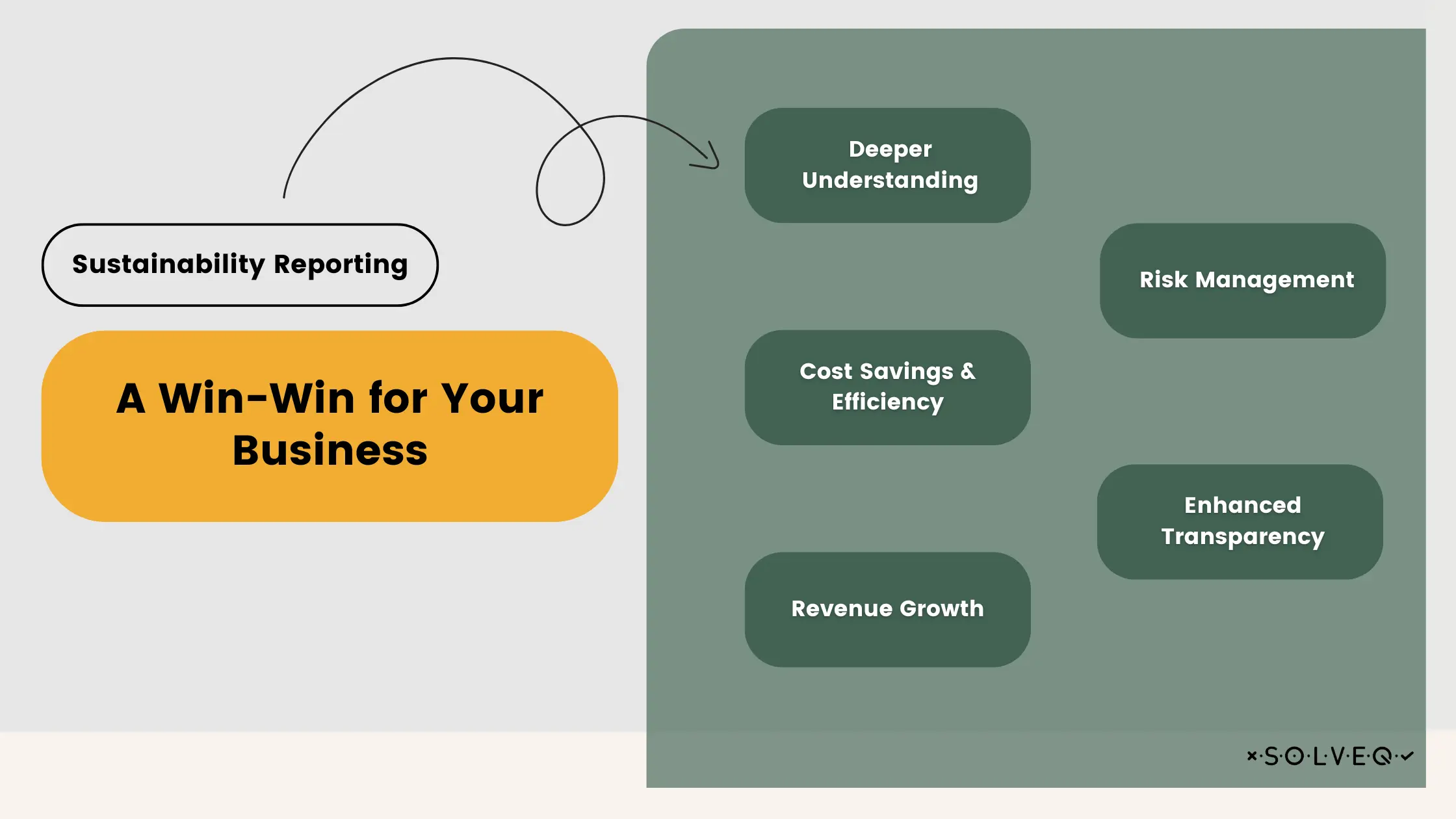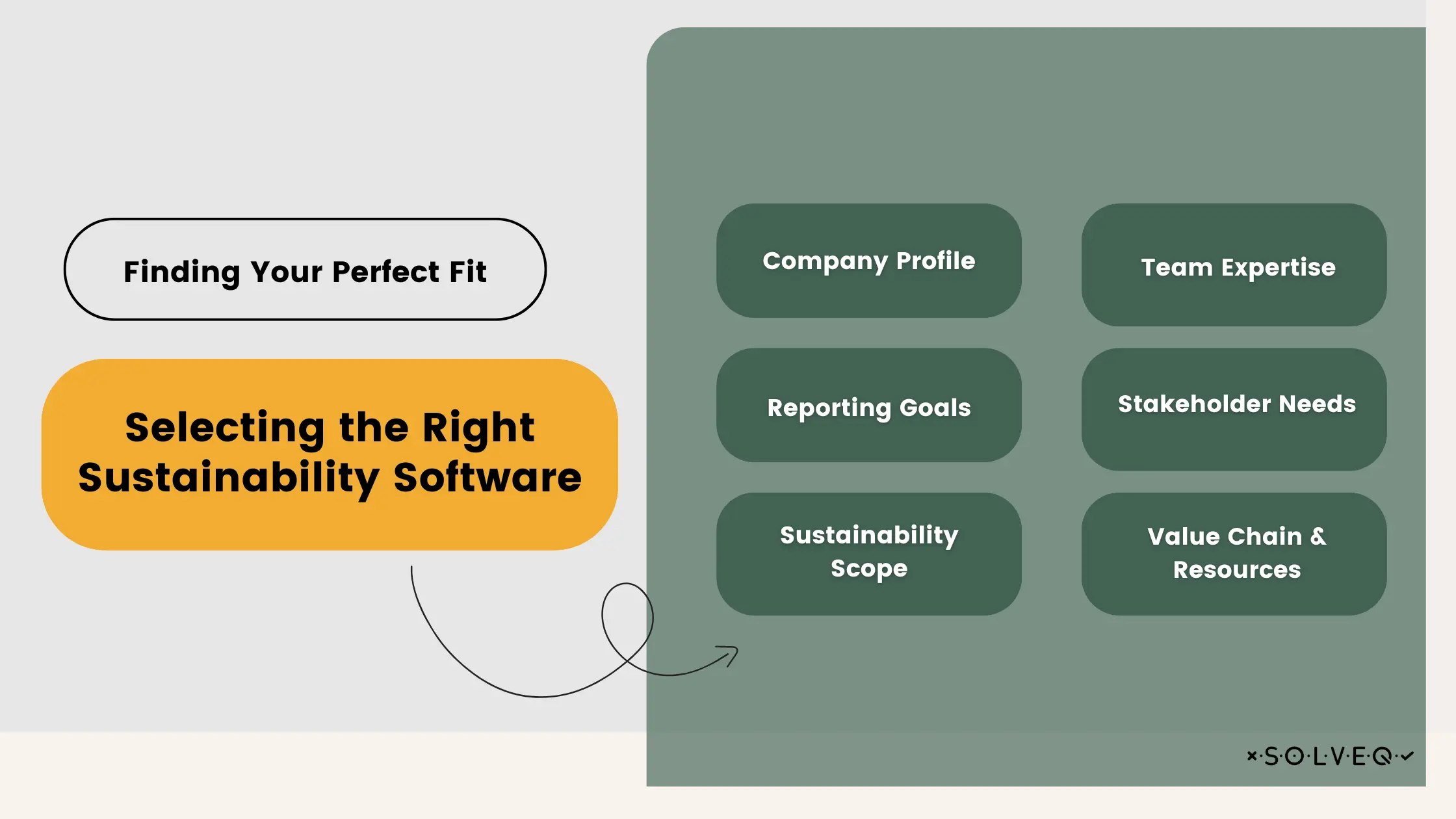Streamline Your Sustainability Efforts in 2024: Top Environmental Management Solutions
24 Apr 2024 • 17 min read

Marcin Kulawik

Sustainability in 2024 in no Longer Optional. Climate change and environmental threats are pushing businesses to embrace eco-friendly practices. The EU's recently updated CSRD (as of April 2024) expands mandatory ESG reporting, impacting many more companies. While the US hasn't implemented such regulations yet, it's a growing trend.
The key to navigating this change? Sustainability software. But with so many options, choosing the right one can be daunting. We've got you covered! Partnering with SolveQ, we'll provide valuable tips to help you select the perfect software for a greener future.
The ESG Imperative: Reporting for a Sustainable Future
In a world facing climate change and ecological threats, sustainable business practices are no longer a nicety – they're essential.
Enter ESG reporting – the process of disclosing a company's environmental, social, and governance (ESG) practices. This transparency allows investors, stakeholders, and consumers to assess a company's commitment to sustainability.
The European Union's updated Corporate Sustainability Reporting Directive (CSRD), effective January 2023, significantly impacts the game. Now, an estimated 50,000 small and medium-sized enterprises (SMEs) are required to report on their ESG efforts, joining larger companies already subject to the directive.
While the United States hasn't mandated ESG disclosure yet, it's a growing trend with potential future regulations.
So, how can businesses navigate this evolving landscape?
Sustainability Software: Your Ally in Greener Operations
Sustainability software can be a powerful tool for managing and reporting ESG performance. However, with numerous options and a dynamic regulatory environment, choosing the right one can be challenging.
Stay tuned! In the following sections, we'll explore valuable tips from SolveQ to help you select the perfect sustainability software, propelling your business towards a greener future
ESG Reporting: A Deep Dive
ESG reports provide a comprehensive picture of a company's performance across three core areas:
- Environment: This section details a company's efforts to combat climate change, reduce pollution, and manage resources sustainably. Look for information on greenhouse gas emissions, waste management, and biodiversity initiatives.
- Social: This section explores how a company interacts with its workforce and society. It covers aspects like employee well-being, diversity and inclusion practices, community engagement, and human rights considerations.
- Governance: This section evaluates a company's leadership structure, internal controls, and ethical practices. It explores areas like board composition, executive compensation, anti-corruption measures, and shareholder rights.
Understanding ESG Scores
Think of ESG scores as a company's sustainability report card. These third-party ratings assess a company's ESG performance and potential risks. Different providers use their own methodologies, but they all consider a variety of ESG metrics.
Who Provides ESG Scores?
Some leading ESG rating agencies include:
- MSCI ESG Ratings
- Sustainalytics
- S&P Global Ratings (formerly Dow Jones Sustainability Index)
- Moody's ESG Solutions
The Regulatory Landscape
ESG regulations vary by region. The European Union (EU) is a leader in this area, with a comprehensive framework promoting sustainable investment and environmental goals. Here's a simplified overview of the EU's approach:

- Incentivizing Sustainability: The EU promotes sustainable practices through initiatives like the Sustainable Finance Agenda and the Sustainable Corporate Governance Initiative.
- Enhancing Transparency: The EU mandates ESG reporting through regulations like the SFDR (Sustainable Finance Disclosure Regulation) and the CSRD (Corporate Sustainability Reporting Directive). These regulations require companies to disclose their ESG risks, strategies, and performance.
- Defining Sustainability: The EU Taxonomy establishes a classification system for environmentally sustainable activities, preventing greenwashing and directing investments towards truly sustainable organizations.
Key Takeaways
- ESG reporting provides valuable insights into a company's sustainability practices.
- ESG scores offer an external assessment of a company's ESG performance and risk exposure.
- Regulatory frameworks are evolving to promote transparency and accountability in ESG practices.
Stay tuned for the next section, where we'll explore valuable tips from SolveQ to help you choose the perfect sustainability software, propelling your business towards a greener future.
Sustainability Reporting: A Win-Win for Your Business
Sustainability reporting isn't just about complying with regulations; it's a strategic tool with tangible benefits for your company. Let's explore how sustainability software unlocks these advantages:

- Deeper Understanding: Sustainability management can be complex. Sustainability software simplifies data collection and analysis, providing a clearer picture of your environmental and social impact across your entire value chain. This empowers you to make informed decisions and chart a course towards your sustainability goals.
- Cost Savings & Efficiency: Sustainability software streamlines processes and eliminates errors, saving time and money in the long run. It also helps identify areas of waste and inefficiency, allowing you to optimize resource use (energy, water) and supply chains. These optimizations translate directly to cost reductions.
- Revenue Growth: Sustainability isn't just about the environment; it's about attracting new customers. Millennials and Gen Z, dominant consumer groups, prioritize companies with strong sustainability practices. By demonstrating your commitment through transparent reporting, you unlock opportunities to attract these valuable customers and boost revenue.
- Risk Management: Natural disasters, political instability, and pandemics can disrupt operations and damage reputations. Sustainability software helps quantify potential risks and identify mitigation strategies. Proactive risk management fosters resilience and ensures you stay ahead of the curve.
- Enhanced Transparency: Sustainability software empowers you to track progress towards sustainability goals aligned with climate frameworks and international reporting standards. This allows you to generate transparent reports for stakeholders, building trust and strengthening your brand reputation.
Sustainability reporting, powered by the right software, benefits both your business and the environment. In the next section, we'll explore valuable tips from SolveQ to help you choose the perfect sustainability software for your company.
Finding Your Perfect Fit: Selecting the Right Sustainability Software
Choosing the right sustainability software can feel overwhelming, but a clear internal assessment can streamline the process. Here are key factors to consider:

- Company Profile: Match the software's capabilities to your organization's size and ESG reporting requirements.
- Reporting Goals: Identify your objectives for using the tool, whether it's streamlining data collection, managing compliance, or enhancing stakeholder engagement.
- Sustainability Scope: Define the boundaries of your sustainability reporting, including environmental, social, and governance aspects, and consider industry-specific metrics you'll need to track.
- Team Expertise: Evaluate the technical skills of your team and choose software that aligns with their capabilities.
- Stakeholder Needs: Identify the reporting frameworks (e.g., GRI, SASB) your stakeholders require and ensure the software supports them.
- Value Chain & Resources: Consider the complexity of your value chain and the type of data you need to collect. Assess any existing sustainability resources that might integrate with the software
By carefully considering these factors, you can select a software solution that empowers your organization to achieve its sustainability goals.
Finding Your Ideal Sustainability Software Partner
Staying informed about the latest sustainability management platforms is crucial. Here's a curated list of some prominent solutions to help you navigate your selection process (Please note that this is not an exhaustive list):
- MSCI ESG: This software offers a comprehensive solution for managing and reporting ESG data. It provides tools for data collection, analysis, reporting, and risk management, empowering companies to improve their ESG performance and meet stakeholder expectations.
- IBM Envizi: This comprehensive software solution helps businesses manage and report on their Environmental, Social, and Governance (ESG) data. It provides tools for data collection, analysis, reporting, and risk management. IBM Envizi empowers companies to streamline their sustainability efforts, improve ESG performance, and meet stakeholder expectations, particularly with compliance reporting requirements like the CSRD.
- Benchmark ESG: This platform offers a suite of tools designed to empower businesses in their sustainability journeys. It provides features for data collection, analysis, and reporting, along with access to valuable ESG ratings and benchmarks. Benchmark ESG caters to organizations seeking to enhance their sustainability efforts and demonstrate their commitment to ESG best practices.
- Diligent ESG: This platform simplifies data collection, benchmarking, and reporting for ESG performance. It caters to businesses seeking to streamline their sustainability efforts and enhance transparency.
- Greenly: This user-friendly SaaS solution streamlines carbon management for companies of all sizes. It provides tools for measurement, reporting, and reduction strategies, empowering businesses to reduce their environmental impact.
- Novata: This cloud-based platform focuses on simplifying ESG data collection, analysis, and reporting. It boasts user-friendly interfaces and robust data management capabilities designed to streamline sustainability efforts, particularly for smaller and medium-sized businesses (SMBs).
- Workiva: While not exclusively focused on ESG, Workiva offers a powerful collaboration platform with features suited for sustainability reporting. It facilitates data collection from various sources, streamlines reporting workflows, and enables collaboration among internal teams.
- Novisto: This cloud-based platform simplifies ESG data collection, analysis, and reporting. It caters to businesses of various sizes and offers features like streamlined data collection workflows, intuitive dashboards, and comprehensive reporting tools. Novisto is a strong option for organizations seeking a user-friendly and efficient solution for their sustainability reporting needs.

Additional Considerations
While this list provides a starting point, remember to consider your specific needs when selecting software. Here are some additional factors to keep in mind:
- Company size and industry: Different platforms cater to the needs of businesses of varying sizes and complexities.
- Sustainability goals: Identify your key objectives – is it data management, stakeholder engagement, or compliance reporting?
- Ease of use: Consider the technical expertise within your team and choose software with a user-friendly interface.
- Scalability: Ensure the software can grow alongside your organization's evolving sustainability needs.
- Integration capabilities: Assess if the software integrates with other systems you use (e.g., CRM, ERP) for seamless data flow.
Remember: Partnering with the right software provider is key to achieving your sustainability goals. By carefully evaluating your needs and conducting thorough research, you can find a solution that empowers your business to move towards a more sustainable future.
Should You Go Custom? Tailoring Sustainability Software to Your Needs
While off-the-shelf sustainability software offers a convenient approach, custom solutions can unlock a strategic advantage for certain companies. Here's when building bespoke software might be the right fit:
- Unmatched Needs: Your organization may have unique ESG (environmental, social, and governance) requirements that pre-built software struggles to fulfill. A custom solution can be crafted to address your specific challenges and workflows, maximizing efficiency and delivering tailored results.
- Data Powerhouse: Custom software empowers you to centralize and automate data collection, analysis, and reporting for comprehensive ESG management. This reduces errors, enhances data quality, and provides deeper insights into your sustainability performance, leading to better decision-making.
- Standing Out from the Crowd: A custom solution can differentiate your company by offering features and functionalities unavailable in generic options. This competitive edge allows you to showcase your commitment to sustainability in a unique way and potentially outperform rivals in ESG initiatives.
- Future-Proof Flexibility: As your business evolves, your sustainability needs will too. Custom software can be designed with scalability in mind, ensuring it adapts to your growth and changing requirements over time.
- Seamless Integration: A custom solution integrates effortlessly with your existing systems, like ERP (Enterprise Resource Planning) and CRM (Customer Relationship Management) tools. This eliminates data silos, streamlines workflows, and enhances overall operational efficiency.
Remember: Deciding between custom and off-the-shelf software requires careful consideration of your specific needs and budget. By carefully weighing your options, you can find the most cost-effective solution to propel your commitment to a sustainable future.

Why Partner with SolveQ for Your Sustainability Journey?
At SolveQ, we understand the complexities of achieving sustainability goals. As a custom software development company, we specialize in crafting innovative technology solutions tailored to your unique ESG (environmental, social, and governance) strategy.
Our expertise empowers organizations of all sizes, from budding startups to established enterprises, to navigate sustainability challenges. We offer a comprehensive approach, encompassing:
- Custom Sustainability Software Development: Our team designs and builds bespoke software solutions that seamlessly integrate with your existing systems, streamline data management, and provide actionable insights.
- Ongoing Maintenance and Support: We ensure your sustainability software remains optimized and evolves alongside your changing needs, maximizing its long-term value.
- Collaborative Partnership: We believe in fostering a collaborative partnership, working closely with you to understand your vision and translate it into a successful software solution.
Together, Let's Build a Sustainable Future
At SolveQ, we're passionate about leveraging technology to create a greener future. If you're ready to embark on this journey and bring your sustainability vision to life, we invite you to connect with our ESG software experts today.
Share:
Looking for expert development team?
Schedule a call with Tech Consultant

Marcin Kulawik
Founder and CEO of SolveQ. Huge fan of building things with purpose, agility, and having fun while changing the World. Loves his family, teammates, and nature.